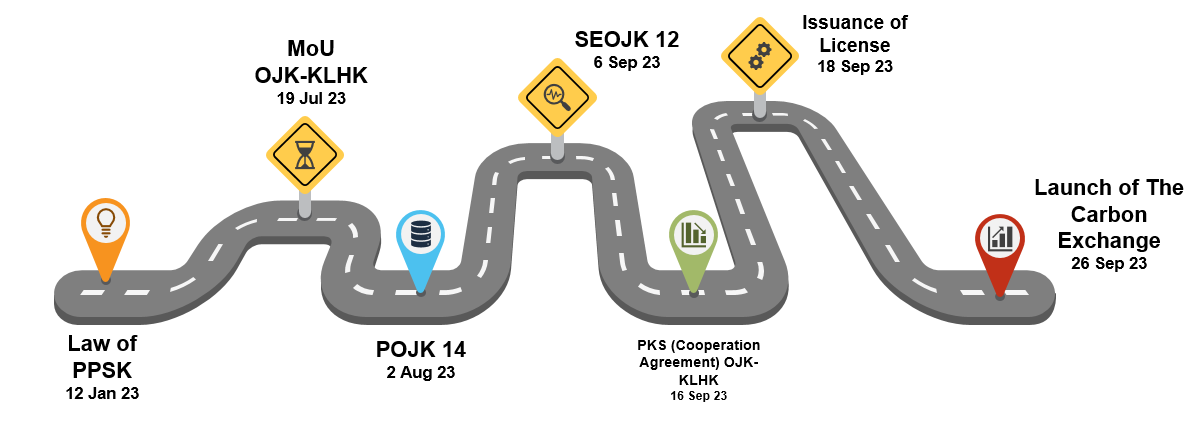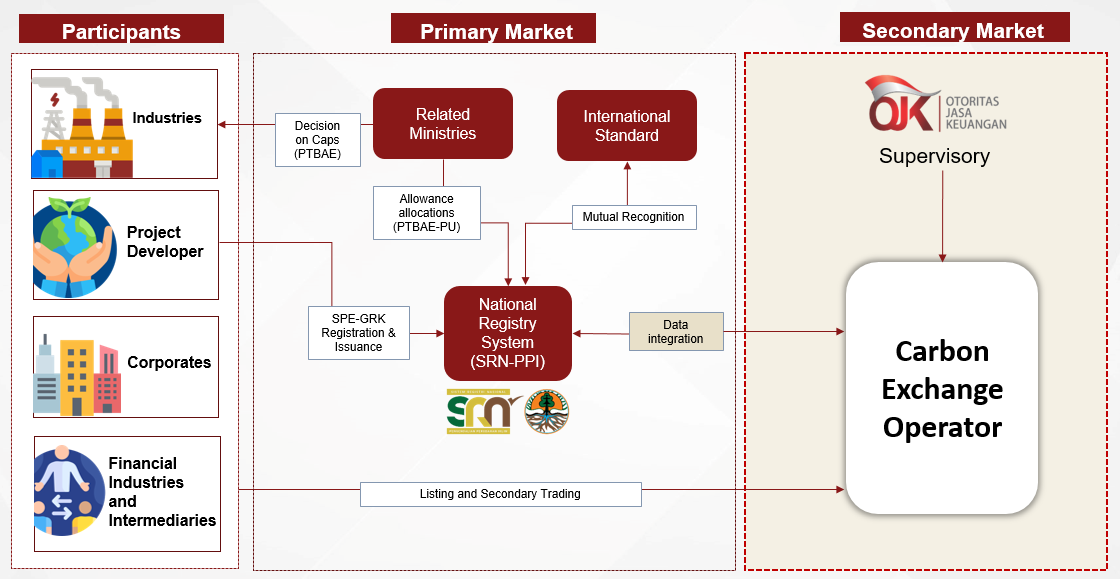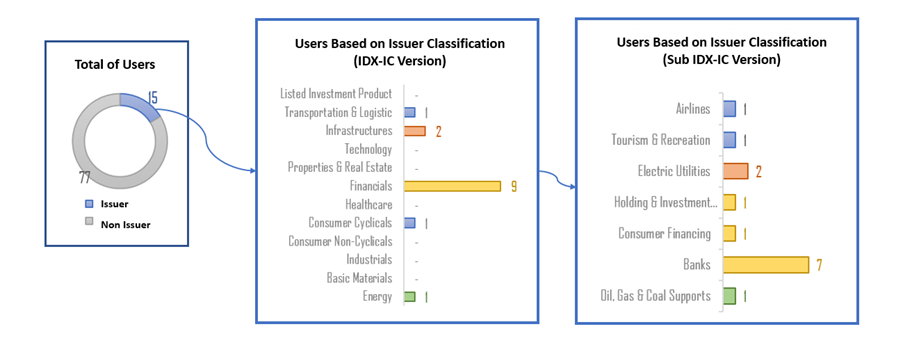Global Commitment to Emission Reduction
a. Kyoto Protocol (1997 – 2012)
A legally binding international agreement on climate change. This agreement was signed on December 11, 1997.
b. Paris Agreement (2015)
The Paris Agreement is a legally binding international agreement on climate change (limiting the increase in global temperatures to below 2°C or 1.5°C, compared to pre-industrial global temperature levels). Commitments to the agreement are stated in the Nationally Determined Contribution (NDC).
c. Indonesia's ENDC Target
Through the Enhanced Nationally Determined Contribution (ENDC), Indonesia has contributed to efforts to reduce emissions by planning a target of reducing emissions by 31.89% with its own efforts to 43.2% with international support compared to BaU in 2030. Based on Presidential Regulation Number 98 of 2021 concerning the Economic Value of Carbon, Carbon Trading is one of Indonesia's efforts to reduce carbon emissions.
d. Net Zero Emission 2060
Net Zero Emissions (NZE) 2060 is Indonesia's commitment to balance the amount of greenhouse gas emissions released into the atmosphere with emissions absorbed by the earth. This commitment is part of a global effort to reduce the impact of climate change and Indonesia's responsibility to future generations.
The Milestone of Carbon Trading through Carbon Exchange


January 12, 2023: Ratification of Law of the Republic of Indonesia Number 4 of 2023
July 19, 2023: OJK and KLHK agree to expand cooperation and coordination in the implementation of NEK, especially through Carbon Exchange trading
August 2, 2023: Ratification of POJK Number 14 of 2023
September 6, 2023: Determination of SEOJK Number 12 of 2023
September 16, 2023: Cooperation Agreement between OJK and KLHK
September 18, 2023: Issuance of Carbon Exchange Organizer Business License
September 26, 2023: Launch of the Carbon Exchange (IDX Carbon)
Regulatory Framework
I. Laws
Law of the Republic of Indonesia Number 4 of 2023 concerning Development and Strengthening of the Financial Sector Keuangan
Law of the Republic of Indonesia Number 16 of 2016 concerning Ratification of the Paris Agreement to the United Nations Framework Convention on Climate Change
II. Presidential Regulation
Presidential Regulation Number 98 of 2021 concerning Implementation of Carbon Economic Value for Achieving Nationally Determined Contribution Targets and Controlling Greenhouse Gas Emissions in National Development
III. Ministerial Regulations
Regulation of the Minister of Environment and Forestry Number 21 of 2022 concerning Implementation Procedures for the Application of Carbon Economic Value
Regulation of the Minister of Environment and Forestry Number 7 of 2023 concerning Procedures for Carbon Trading in the Forestry Sector
Regulation of the Minister of Energy and Mineral Resources Number 16 of 2022 concerning Procedures for Implementing Carbon Economic Value in the Power Generation Subsector
IV. OJK Regulation
POJK Number 14 of 2023 concerning Carbon Trading through Carbon Exchange
SEOJK Number 12 of 2023 concerning Procedures for Organizing Carbon Trading through Carbon Exchange
V. Circular Letter of the Indonesia Stock Exchange
SE-00013 Carbon Exchange Service User Fees
SE-00014 Standardization of Carbon Unit Grouping
Carbon Units
I. PTBAE-PU
Technical Approval of Upper Emission Limits – Business Actors (PTBAE-PU) is a carbon unit whose trade uses a cap-and-trade mechanism that is generally applied in the mandatory market. Business actors who have been selected by the Government will be given a cap or Upper Emission Limit (BAE) in the form of a quota allocation for a certain period. Business actors who exceed the specified cap can buy carbon units from other business actors who produce lower emissions than the given cap. PTBAE-PU can also be obtained through an auction mechanism organized by the relevant Ministry.
II. SPE-GRK
Greenhouse Gas Emission Reduction Certificate (SPE-GRK) commonly known as Carbon Credit is a letter of proof of emission reduction by businesses and/or activities that have gone through the Measuring, Reporting, and Verification (MRV) process and are recorded in the National Climate Change Control Registry System (SRN PPI) in the form of a number and/or registry code. Companies can purchase carbon units to be used to meet emission reduction targets or meet commitments in carbon neutrality or net zero emissions. SPE-GRK can be traded per project through the Auction, Marketplace, or Negotiation mechanism, where business actors can buy and sell certain SPE-GRK through the Carbon Exchange. In addition to per project, SPE-GRK can also be traded according to the type of grouping in the regular market. In this market, each SPE-GRK traded on the Carbon Exchange will be grouped into a certain standard, and the Buyer will know the details of the project purchased after the transaction is made.
Carbon Trading Ecosystem


Service Users or Carbon Traders must currently be legal entities as stated in POJK Number 14 of 2023. Market organizers (Carbon Exchanges) must obtain license from OJK to be able to organize carbon trading. The system used by market organizers must also be registered in the National Registry System (SRN-PPI). So that in accordance with the mandate of the Law and POJK 14 of 2023, OJK has the responsibility to supervise transactions in the secondary market to create an orderly, fair and efficient market ecosystem.
Related Institutions
SRN-PPI
National Registry System for Climate Change (SRN PPI) is a web-based management, data provision, and information system on actions and resources for Climate Change Mitigation, Climate Change Adaptation, and Carbon Economic Value (CVE) in Indonesia.
IDX Carbon
The first carbon exchange in Indonesia organized by the Indonesia Stock Exchange (IDX). IDXCarbon provides carbon trading infrastructure supervised by the Financial Services Authority (OJK).
Statistics
Service Users Statistics

*) Data as of November 29, 2024
Contact Us Directorate of Financial Derivatives and Carbon Exchange Supervision
Email: dpdb@ojk.go.id
